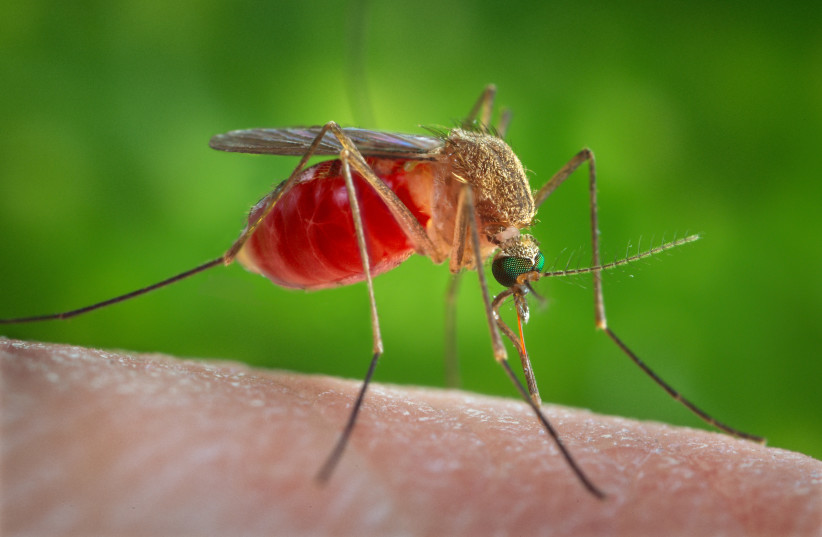For the first time this year, mosquitoes infected by birds with West Nile (WNV) have been discovered in Israel – this time in the Eilat and Arava region. According to the Health Ministry, one person has died from the disease since the beginning of the year and another person who was infected is hospitalized in serious condition.
The Environmental Protection Ministry demanded that the Eilat Municipality and the Eilat Regional Council monitor the situation; eliminate standing water in yards, on roofs and in shelters; and kill the mosquitoes.
Dr. Oren Ashet Kathabi of the Health Ministry’s epidemiology department said that since there is no vaccine against West Nile fever – whose peak activity usually occurs between mid-August and mid-October – it is recommended to take extra care in order to avoid mosquito bites.
Fortunately, most people infected with WNV do not feel sick. About one in five people who are infected develop a fever and other symptoms. Only about one in 150 develop a serious, sometimes fatal, illness.
What can you do against the West Nile virus?

You can reduce your risk of WNV by using insect repellent and wearing long-sleeved shirts and long pants to prevent mosquito bites. The symptoms are:
- Fever;
- Headache;
- Body aches;
- A skin rash on the trunk of the body;
- Swollen lymph glands.
The most common long-term effects in serious cases are:
- Depression;
- Tremors;
- Fatigue;
- Memory problems;
- Extremity weakness;
- Word-finding difficulty;
- Headaches.
Because it’s a viral condition, there is no cure for WNV, but sufferers can take over-the-counter pain relievers such as aspirin or ibuprofen to relieve symptoms.
Everything you need to know about WNV
Discovered in Uganda in 1937, the virus was first detected in North America in 1999 and reached Europe, Africa, Asia, Australia and North America. Thousands of cases are reported in the US every year. Severe disease may also occur in horses, for which a vaccine is available.
When a person is in an area that has WNV, it is important to avoid outdoor activity. One should also wear clothing that covers more skin, such as long sleeves and pants. It is also recommended to protect oneself from mosquito bites by installing nets on the windows of the house and applying mosquito repellents if necessary. Turn on fans inside the house and when sitting outside the house.
Residents of areas with WNF should locate, remove, puncture or turn over any container that may accumulate water such as old tires, buckets and barrels. Prevent water from accumulating in the bottoms of pots and planters. Cover swimming pools and ensure the presence of fish in ornamental ponds so they can eat the larvae. Clean and empty gutters.
“This is the first time this year that we have found infected mosquitoes in Israel,” according to Dr. Gal Zagron, director of the pest and control division at the Environmental Protection Ministry. “They were captured in the Syrian-African rift zone, which is a bird migration route and is known to be an endemic area for WNF. Mosquitoes develop in stagnant water when temperatures are high.
"This is the first time this year that we have found infected mosquitoes in Israel. They were captured in the Syrian-African rift zone, which is a bird migration route and is known to be an endemic area for WNF. Mosquitoes develop in stagnant water when temperatures are high."
Dr. Gal Zagron, director of the pest and control division at the Environmental Protection Ministry.
“Such events will increase in frequency in the coming years with the worsening of the climate crisis, and we call on the authorities and localities to urgently deal with places where mosquito hazards are detected.”
